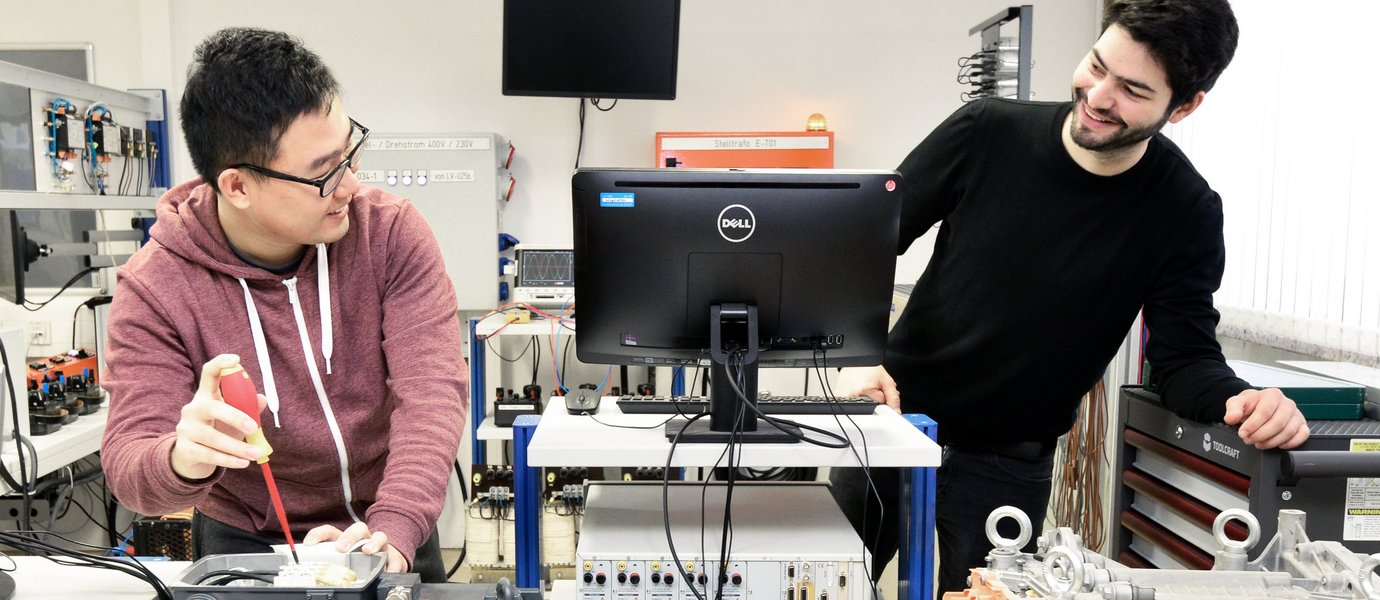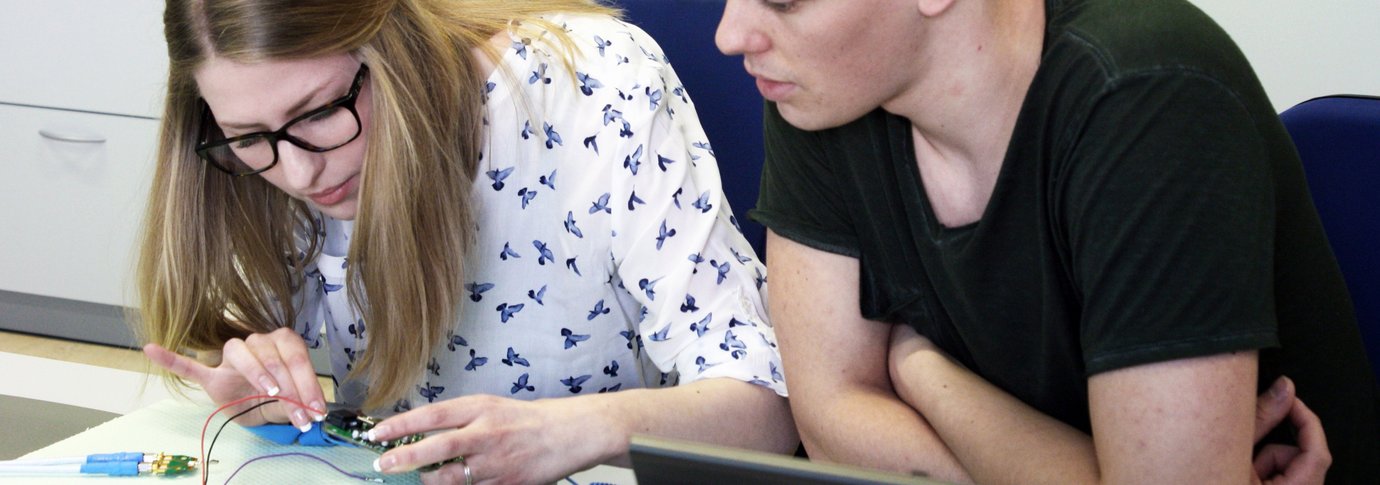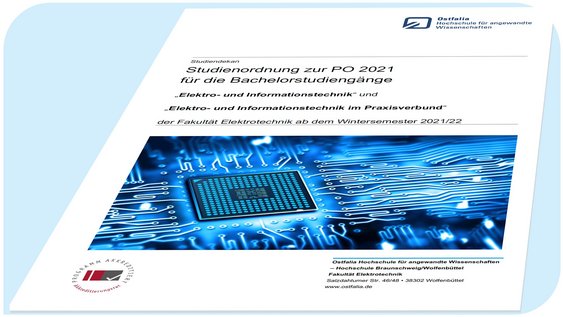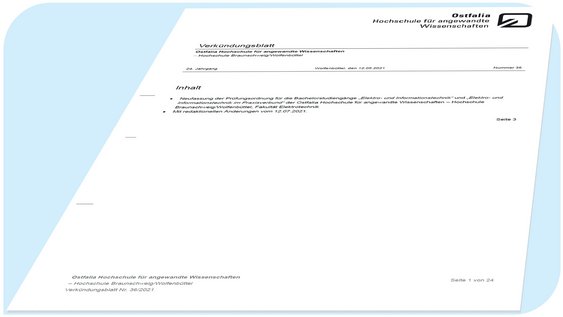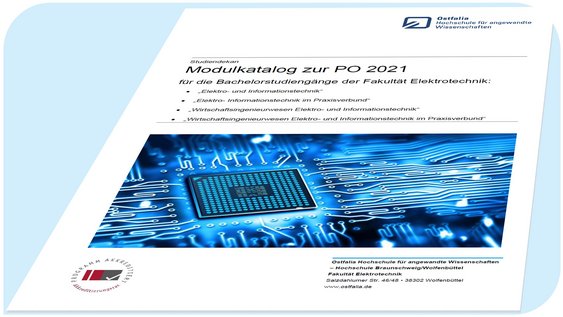Electrical Engineering and Information Technology – Dual Programme
Theory and practice
Do you want to change the world as an electrical and information technology engineer and work on pioneering topics such as 5G technologies, Industry 4.0 or renewable energies? Do you not only want to learn theory , but also get off to a flying start in practice? Our regular degree programme in Electrical Engineering and Information Technology is also available as a combined degree programme - in cooperation with our industrial partners from the region.
Take this opportunity to get the most out of your degree programme and start shaping your career path now!
Also discover our related degree programmes:
Electrical Engineering and Information Technology – Bachelor's degree programme
Electrical Engineering, Business Administration and Economics – Bachelor's degree programme
Electrical Engineering, Business Administration and Economics – Dual Programme – Bachelor's degree programme
Facts at a glance
Apply now!
Secure your place at the Faculty of Electrical Engineering and Information Technology!
To the applicationDetails of the degree programme
Fields of activity
With your Bachelor of Engineering (B. Eng.) degree, you have excellent career and salary prospects. Your areas of work are diverse:
- Hardware and software development
- System and plant development
- Product development
- Research and development
- Project planning and management
- Technical sales
- Consultancy
- and much more.
in various industries, such as the
- Automotive industry and railway technology
- Aerospace
- Power generation and supply
- Information and communication technology
- Measurement and automation technology
- Medical technology
- Robotics
- Autonomous systems
Specialisations
In the main degree programme, you can choose between our four specialisations:
- Automation Technology
- Sustainable Energy Systems and Electromobility
- Information Technology
- Computer Engineering
Programme content
Field of study Automation Technology
- Industrial Automation
- Industrial Network
- Power Electronics
- Control Engineering
- Computer Architectures
Study programme Sustainable Energy Systems and Electromobility
- Electromobility
- Energy Transmission
- Smart Energy
- Power Electronics
- Control Engineering
Information Technology specialisation
- Digital Information Transmission
- Digital Signal Processing
- Radio Communication
- Network Technologies
- Computer Architectures
- Signal and System Theory
Computer Engineering specialisation
- Databases & Blockchain Technology
- Design of Digital Systems
- Embedded Toolchain
- Microcontroller
- Robotics & Actuators
Apprenticeships
Depending on the cooperating company, we offer two study options:
In the training-integrated degree programme, you also complete a commercial apprenticeship in a cooperating company and acquire a commercial qualification in addition to the Bachelor of Engineering degree. The final industrial examination is regularly organised by the Chamber of Industry and Commerce.
In the practice-integrated degree programme, you will complete extensive practical phases in the cooperating company. However, there is no compulsory vocational schooling here and you are not aiming for a skilled worker qualification. In this variant, a practical semester can also be replaced by distributed practical phases totalling 18 weeks at the partner company.
Both options require a contract with one of our industrial partners.
Possible training occupations if you choose the training-integrated study option:
- Electrical systems fitter,
- Electronics technician for automation technology,
- Electronics technician for operating technology,
- Electronics technician for devices and systems,
- Electronics technicians for information and systems technology,
- IT specialists for application development,
- Mechatronics technicians
Industry partner
We co-operate with approx. 40 industrial companies from the Braunschweig region: to the overview
After the Bachelor
Study plan
1–2, 4 semester Compulsory modules for basic studies (87 ECTS) (1. 2. 4. Semester) - Electrical Engineering
- Computer engineering
- Engineering Mathematics
- Digital Engineering
- Electrical measurement technology
- Electronic components and circuits
- Physics
Compulsory elective module (1. 2. 4. Semester) - Learning and working techniques
- Rhetoric and argumentation
- Technical foreign language
- Technical English 1
- Materials technology
Compulsory modules for basic studies (87 ECTS) (1. 2. 4. Semester) - Electrical Engineering
- Computer engineering
- Engineering Mathematics
- Digital Engineering
- Electrical measurement technology
- Electronic components and circuits
- Physics
- Electrical Engineering
- Computer engineering
- Engineering Mathematics
- Digital Engineering
- Electrical measurement technology
- Electronic components and circuits
- Physics
Compulsory elective module (1. 2. 4. Semester) - Learning and working techniques
- Rhetoric and argumentation
- Technical foreign language
- Technical English 1
- Materials technology
- Learning and working techniques
- Rhetoric and argumentation
- Technical foreign language
- Technical English 1
- Materials technology
Why study electrical engineering and information technology in a combined degree programme?
- 1
-
Direct application of what you have learnt
You can immediately apply the theoretical knowledge you acquire in a practical environment. This gives you a better understanding of the content and allows you to experience the practical aspects of your subject at first hand.
- 2
-
Networking opportunities
By working closely with companies, you will get to know important contacts at an early stage. These can be useful when looking for a job later on and help you to establish yourself in the industry. You will often be taken on directly by the industry partner after graduation.
- 3
-
Improved career opportunities
With a practice-based degree programme, you will be in particularly high demand. Your mix of theoretical knowledge and practical experience makes you particularly attractive to potential employers and significantly improves your chances of getting a job.
- 4
-
Internship remuneration
And last but not least, you will of course also benefit from the internship allowance that your industry partner usually pays you during your studies.
Useful links and files
Do you still have questions?
Our Central Student Advisory Service (ZSB) will be happy to support you!
Building Am Exer 45, Room 101 -105
availability by phone:
Monday, Tuesday and Wednesday: 9:00 AM - 3:30 PM
Thursday: 1:00 PM - 3:30 PM
Friday and before holidays: 9:00 AM - 12:00 PM
